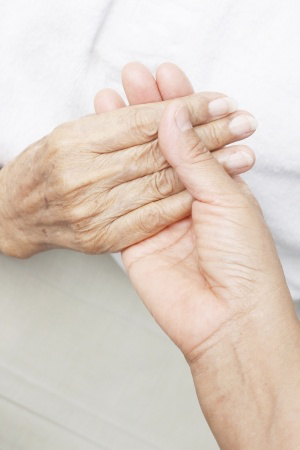
If your mother has recently had a stroke, you probably have a lot of questions. Will she recover? Can she go home? Does she need assisted living? Will I have to put her in a nursing home? It’s a difficult and frightening time—especially if you’ve been acting as her primary caregiver.
You want to make sure that mom has the level of care she needs, but, after the stroke, you’re not sure what that means anymore. Luckily, there are a few steps you can take that can help you find your bearings.
1. Learn What You Can from Healthcare Professionals
The first person you’ll want to talk to would, of course, be the physician who is treating her for the stroke. By talking with the doctor, you can determine the severity of the stroke and how it has affected her ability to live alone safely.
Depending on the severity of mom’s stroke, you may no longer be able to get by with stopping in a few times a week to run errands, restock pills, or sit and chat. You may, in fact, need to start looking into professional eldercare. There are a number of factors to consider when deciding if your mom needs more care:
- Mom's health prior to the stroke.
- How the stroke has affected her mental and physical abilities.
- Rehabilitation needs.
- Your ability to provide additional care.
If doctors are optimistic about her recovery, your mother may be able to continue to live on her own safely after a short rehab period. If your mom needs significant care and her recovery is going to be long, she may need to stay in a rehabilitative nursing home until her health improves. If the stroke has had long-lasting effects, you may want to start looking into more permanent residential care.
While mom may be eager to head straight home, her care team will be able to tell you what’s best for her health and safety.
2. Talk with Your Support Team
As a primary caretaker for a loved one, you have probably developed a support team. Whether your team is made up of family, friends, or other service providers, sit down and talk with them about the realities of having mom move back home after a stroke. While you may believe you can step up to provide the increased level of care she needs, your support team will be able to provide a realistic view of the situation. You can't make this decision alone, and this is a time to sit and have an honest discussion about what’s best for you and for mom—that may mean finding a good assisted living community here in Cincinnati.
3. Consider Your Own Needs
One of the hardest aspects of taking care of a loved is considering your own needs. Although it feels selfish, you have to put yourself first in this situation. If taking care of your mom after a stroke is going to be financially, physically, and emotionally draining, assisted living is an excellent alternative.
Consider your stress levels. Think about the day to day practicality of taking care of your mom before she had the stroke. If it was already hard and overwhelming to provide the care she needed, it is probably time to consider a residential option.
Cincinnati’s assisted living communities provide residents with the individual care they need and deserve which, in turn, helps their family avoid caregiver burnout and just enjoy spending time with elderly loved ones.
4. Be Practical
Taking care of a person who has had a stroke at home is hard. This would require more physical exertion from you, plenty of appointments for therapies, and time off of work to make these things happen. If your mom has a good prognosis, let her get the care she needs in a facility before returning home. You don't want to strap yourself financially by needing time off to make it work at home. Talk with your mom and let her know you are there for her. Let her know that it is simply not a good idea—for you or for her—to take care of her at home.












